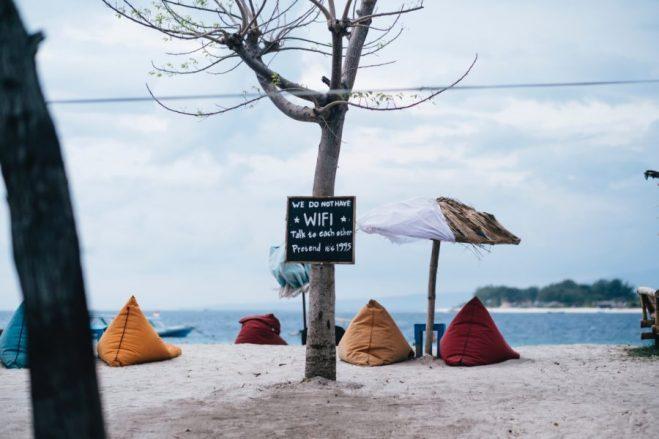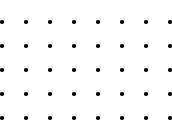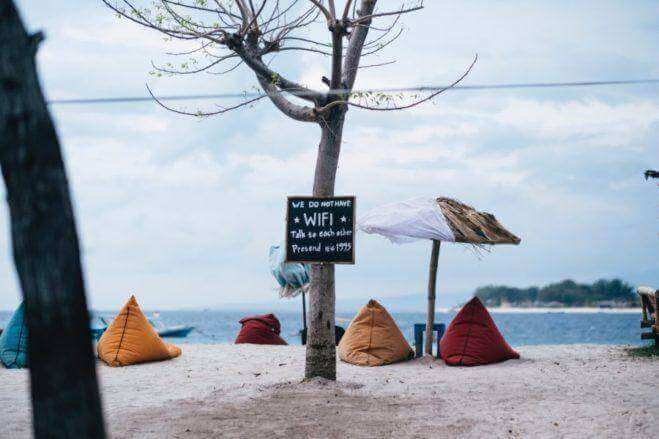
Here’s the idea: A straight week of disconnection. No work, reduced wifi, and plenty of time to focus on the life things I otherwise can’t.
Listen to the full pod here:
It’s something I’ve recently started doing, and it’s feeling more and more essential to me in this nomadic lifestyle.
But even beyond nomadism, we’re all struggling with the question of taking time off in this digitally addicted world. So in a way, this is how I’m taking a stand:
Disconnecting helps preserve the freedom we’ve worked to achieve
I think we can agree that the biggest “Wow!” factor of this lifestyle is the freedom to change locations. More than anything, it’s what people are fascinated by and what we nomads originally strive for.
Once attained, though, it’s often followed by a further quest for financial freedom.
Here’s where the holy grail idea of passive income comes into play. If we succeed in disconnecting our time from money, we stand to increase our freedom dramatically. But – this requires building something greater than just offering services; typically, this something takes lots of time, effort, and sacrifice.
I started down this path in 2016 and quickly realized something quite shocking: I hadn’t taken an extended break from answering emails or calls since… 2010. Which was before my nomadic lifestyle!
Ironically, my non-nomadic life had given me more freedom to disconnect. By going nomadic, it seems I simply subbed it for my new location freedom and pursuit of financial freedom.
I realized I could keep digging my own hole with this status quo, or I could proactively try to solve it. And what I did was embrace the old notion of Vacation – a self-imposed intervention with predetermined disconnection guidelines.
What I found: Disconnecting helped my mind… And my business
The main benefits of this week of disconnection quickly became apparent to me:
Live in the now. If your goal is to build a life of financial freedom, you probably can’t escape the countless work tasks it requires. With a week break, the idea is to free yourself and truly appreciate the moment… Which is probably a reason you become a digital nomad in the first place.
Avoid burnout. If you keep flooding yourself with tasks, you’ll inevitably face an internal rebellion. So – this vacation can actually keep you fresh and prevent potential burnout from both traveling and working.
Build a better business. If like me back in 2016, you build a business but find it completely taking over your life, you’ve built it wrong. Taking chunks of time off helps put your business on a more sane path where you aren’t expected to be online 24/7
Here’s how I customize my week of disconnection to make it work
I will say that these details depend on the person. It’s worth playing around with them to see what sticks (and what doesn’t!).
Length and Frequency. I typically go a little over a full week – Friday ‘til the following Saturday – and try to do it once each quarter.
The week isn’t super predetermined, but I do try to schedule it a bit in advance so that I don’t “glitch” on my commitment to it. And if I do glitch, I compensate to make sure I have four of these breaks throughout the year.
Restrictions. Without them, I’ll likely peek at an email and end up working. My personal strategy:
- No emails – This is the big one. Since I basically live in my inbox, this rule really takes me away from my day-to-day.
- No work-related tasks – StartupBlink takes a full backseat; I don’t touch anything remotely related to it.
- No internet on big screens – For me, this means avoiding my laptop and tablet. Especially Netflix, Youtube, and everything that lets you “run away” – they feel a bit like a waste of my week. (Currently pondering whether or not to shut off my phone…)
Theme. I’ve had weeks of movement centered around trekking or backpacking through Colombia. I’ve had stationary weeks catching up with friends and family or camping and enjoying the beach in Eilat. And I’ve even incorporated festivals and big events, like that one World Cup week I spent in Kaliningrad.
Obviously, the list of options can go on and on. And I think these weeks should vary! Different themes can lead to new, fulfilling experiences.
Anchors. After lots of trial and error, I’ve found three main “anchors” my weeks absolutely need so that they won’t be a flop:
- Nature – Unlike my normal nomad tendencies, I opt for the calming presence of small towns or the outdoors. And I love nothing more than walking and walking until something interesting pops up.
- People – Nature isn’t enough on its own; I actively seek the company of positive-minded people as well. Here, being diligent with the pick of accommodation is critical. You want places that support community: Usually hostels, Couchsurfing, or Airbnb with engaging hosts.
- Meaning. Here’s why I opt away from Netflix. You want these weeks to actually make an important difference in your life. That could mean reading a book you’ve been putting off. Making your annual goals. Building a new habit. Introspecting about life.
The idea here is: Don’t just disconnect, but also promote the things you can’t otherwise.
Preparation. Without it, you’ll cancel the week before it starts (or cut it halfway). For instance, I block off my calendar and warn people in advance. This lets them better prepare, and it actually keeps me accountable to go through with it. I’ve even had an accountability partner before just to make sure I don’t back out.
And I also make sure to close all urgent tasks. That way, my mind is free knowing there’s nothing damaging hanging overhead. If anything crazy urgent pops up, I keep an emergency line open.
Last thing: I like to leave my suitcase somewhere so that I can roam around easily. It’s a nice extra layer of freedom, with less travel clumsiness.
Some recommendations for finding Meaning
Discipline is freedom, and when you have too much freedom without discipline, it evaporates.
So – you can spend this week of disconnection pushing yourself to become the person you want to be by establishing life routines. These could be fairly basic (i.e. waking up at a certain hour, no screens in the bedroom, not eating after 6pm)…
… Or they can be what I call big experiments. Think of things you’ve always wanted to try but never pulled the trigger on. THIS is the time to do them because the risk is so low (and the beauty is, they often stay with you past the week’s end!).
Some personal examples:
- I stopped eating sugar for a week in the spring – something that, by the way, I’d never have done while working. Since then, I’ve been completely off of sugar!
- 30 minutes of daily exercise, inspired by an older man with a sword doing Tai Chi outside his tent while camping. Normally, I would’ve thought “Woah… What the hell?” but in my open-minded disconnection state, I didn’t brush it off and instead gave it a shot. Minus the sword.
- Daily fasts and earlier bedtimes. Small, but cool to try out.
Most importantly, I remind myself each day to be grateful for this week. And for however many weeks of disconnection I still have left – they’re not guaranteed or unlimited after all.
Looking to the future
These weeks keep evolving with time. And I’ll be honest – I’m still trying to figure out what works best.
Some ideas I’m currently considering: Increasing the frequency or length of these breaks and committing to a full-on internet or screen stoppage.
Whatever I do, the main concept is living in the now instead of waiting for something to happen to give me more freedom. And if I ever sell my business or acquire enough passive income to move away from full-time work, I want to be prepared for a freer lifestyle.
So – a week of disconnection. Does it sound like something you could use? Or maybe you already do something similar? I’d love to hear your take on it – comment below and I promise I’ll reply shortly!



0 Comments